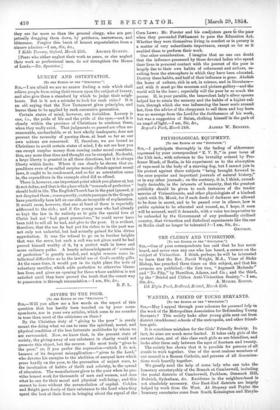GIVING TO THE POOR.
[To THE EDITOR OP THE "SPECTATOR "1
you allow me a few words on the aspect of this question that has hardly been touched on by your corre- spondents, nor in your own articles, which seem to me sounder in tone than most of the criticisms on them ?
By the Christian duty of "giving to the poor" is surely meant the doing what we can to raise the spiritual, moral, and physical condition of the leas fortunate multitudes by whom we are surrounded. Now, we know that, in the present state of society, the giving-away of our substance in charity would not promote this object, but the reverse. He most truly "gives to the poor," or, if you prefer the expression—which I do not, because of its frequent misapplication—" gives to the Lord," who devotes his energies to the abolition of unequal laws which press hardly on the poor, to the prevention of unjust wars, to the inculcation of habits of thrift and sobriety, to the spread of education. The manufacturer gives to the poor when he pro- vides honest work for thousands of men and women, and does what he can for their moral and physical well-being ; and this cannot be done without the accumulation of capital. Cobden and Bright gave freely of their substance to the Lord when they spent the best of their lives in bringing about the repeal of the
Corn Laws ; Mr. Forster and his coadjutors gave t.o the poor when they persuaded Patliament to pass the Education Act.. Whether they were themselves living in comfort or in penury is- a matter of very subordinate importance, except so far as it enabled them to perform their work.
One other consideration. I imagine that no one can doubt that the influence possessed by those devoted ladies who spend. their lives in personal contact with the poorest of the poor is. largely due to their own habits of refinement and culture, re- sulting from the atmosphere in which they have been educated. Destroy these habits, and half of their influence is gone. Abolis1. the home of culture, rich in art, in science, and in literature— and with it must go the museum and picture-gallery—and the- world will be the loser ; especially will the poor be so much the poorer. If, in your parable, the benevolent lady's silver spoons helped her to retain the memory and the habits of a higher cul- ture, through which she was influencing the baser souls around her, then the advice of the clergyman to sell them and buy horn. was no message from the Lord for the furtherance of his work, but was a suggestion of Satan, clothing himself in the garb of an angel of light.—I am, Sir, &c.,


































 Previous page
Previous page